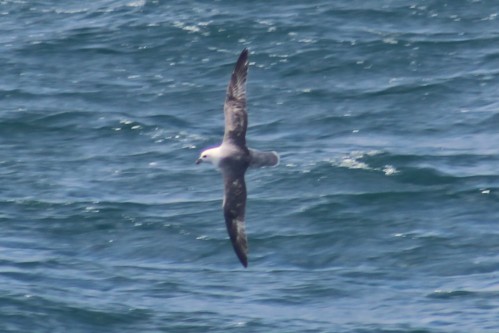Hello again! Jess here, updating you on all the fantastic marine life we have encountered this week, plus a little more about just how important marine mammals are and why they need looking after!

Here is a cheeky fulmar we saw off the coast of Brittany – a relative of the albatros
Sightings update: Well it would appear that I am not the bringer of whales this season, all the action seems to happen in my weeks off (perhaps you heard about that giant breaching fin whale next to the ferry!?). However the common dolphins seem to have been consoling me and we’ve had regular pods racing towards us. In fact I had what was my best ever view of striped dolphins leaping about, which was beautiful! On our very last deck watch of the week some distant pilot whales (which are a large species of dolphin with a deceiving name) did made a sneaky appearance. We had two pods milling by as we sailed to Portsmouth, in the deep water just before we passed over the northern continental shelf in the Bay of Biscay.

A striped dolphin leaping!

A pilot whale
Engaging with passengers continues to be my favourite part of being a Wildlife Officer. It is really wonderful hearing people say that they are going to tell their friends and family about their wildlife experiences on board, and how they plan to reduce their use of plastic products having heard about the problem of marine litter in our presentations.

Here is Katie logging our sightings with lots of keen passengers
I’ve found that attempting to enthuse the public about these animals isn’t exactly a hard sell. Passengers are always excited to hear that there is a chance to see whales and dolphins and it’s clear from watching their reactions when they do see them that they bring huge amounts of joy. We are all in agreement that there is something very mythical and awesome about them, but it is not just joy these creatures give us.

Common dolphin mother and calf
As well as being beautiful and iconic, they also keep our oceans clean, green and fertile. Phytoplankton are microscopic plants that live in the ocean, and provide food for all that lives in the ocean. Little microscopic animals called zooplankton feed on the phytoplankton, and little fish and other creatures feed on the zooplankton. Then larger animals feed on the little fish, which are then eaten by large predators, such as whales and dolphins. Therefore phytoplankton are some of the most important living things and without them, the entire marine food chain would break down. Not only that, as they photosynthesise, phytoplankton actually produce 50% of the earths oxygen. So it’s very important to have healthy phytoplankton, otherwise we might struggle to breath!

Phytoplankton (Photo credit Dr Richard Kirby)
Now here’s where the whales come in… It has been found that whale poo can stimulate the growth of phytoplankton. The whales feed on nutrient rich fish, krill, and squid etc. from the deep water column. As they come up to the surface they release all of these nutrients through their poo, which is what the phytoplankton need to grow. So by having lots of whales and dolphins moving through water columns, migrating across oceans and pooing as they go, its keeps the sea life healthy, and so it keeps us healthy.
Not only that! But when a whale eventually dies, it sinks to the bottom of the ocean, taking with it huge amounts of carbon stored in its body. As the whale decays the carbon is not released into the atmosphere, but instead moves into the marine food chain as small animals eat the dead whale. Even in death these animals provide a service to every other creature, including ourselves, on earth by locking away harmful carbon gases which cause global warming, its body acting as a carbon sink.
That is why we as a charity love to research these vitally important animals and apply our findings to conservation efforts. So although whales and dolphins are beautiful, that’s not the only reason we want to protect them, it’s just an added bonus that they are gorgeous to look at!

Please visit our website if you would like to learn more about ORCA or how to become a member.
Jess – ORCA Wildlife Officer
Leave a comment